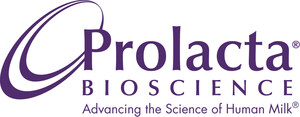DUARTE, Calif., May 19, 2022 /PRNewswire/ -- Prolacta Bioscience®, the world's leading hospital provider of 100% human milk-based nutritional products for critically ill, premature infants, celebrates World Human Milk Donation Day by recognizing the committed donors who play an integral role in providing essential nutrition for infants in neonatal intensive care units (NICUs) throughout the world.
"We couldn't provide lifesaving nutrition to medically fragile infants without the generosity of our dedicated milk donors," said Susan Neumann, vice president of milk resourcing at Prolacta. "We applaud you, we thank you, and we are honored to work with you, not only on World Human Milk Donation Day, but every day."
The dedication donors have shown in pumping, storing, and shipping more than 1.5 million liters of excess breast milk has allowed Prolacta to serve more than 80,000 vulnerable infants globally. The company's 100% breast milk-based products are clinically shown to improve the health of premature infants and reduce the common complications of prematurity.1-6
"There are so many tiny and fragile babies who desperately need the immune support and nutritional components of human milk that formula does not provide. Donor milk is crucially important to their well-being," said Jessa, a milk donor and NICU nurse, who has witnessed the benefits of human milk in her patients. "Donating my breast milk has helped supplement my income so that I can work part time in the NICU, and be home with my girls, so that we don't need to rely on childcare."
Amanda, a two-time donor, said, "I love being a part of such an amazing community. Donating not only gives me the opportunity to help fragile babies across the country, but also allows me to be a stay-at-home mom, while providing for our family. This has also allowed us to build an emergency fund and take some family vacations that never would have been possible with just my husband's income."
Donor breast milk is vital to ensure hospital NICUs have access to nutritional fortifiers made from 100% donor breast milk, as part of an exclusive human milk diet. Cow milk-based fortifiers are linked to feeding intolerance and an increased risk of life-threatening complications in premature infants.2,4,6,7 The major difference between cow milk-based and human milk-based products is the composition — notably, the bioactive components that are unique to human milk. Bioactivity is thought to support infants' immunity, development, growth, and long-term health.8
About Prolacta Bioscience
Prolacta Bioscience® Inc. is a privately held, global life sciences company dedicated to Advancing the Science of Human Milk® to improve the health of critically ill, premature infants. Prolacta's 100% human milk-based nutritional products have been evaluated in more than 20 clinical studies published in peer-reviewed journals. More than 80,000 premature infants have benefited from Prolacta's nutritional products worldwide to date.1 Established in 1999, Prolacta is the world's leading provider of human milk-based nutritional products for hospital use and is also exploring the therapeutic potential of human milk across a wide spectrum of diseases. Prolacta maintains the industry's strictest quality and safety standards for screening, testing, and processing human donor milk. Operating the world's first pharmaceutical-grade human milk processing facilities, Prolacta uses vat pasteurization and a patented, U.S. Food and Drug Administration-reviewed manufacturing process to ensure pathogen inactivation while protecting the nutritional composition and bioactivity of its human milk-based products. Prolacta is a global company with headquarters in Duarte, California, and can be found online at www.prolacta.com, on Twitter, Instagram, Facebook, and LinkedIn.
Media Contact:
Loren Kosmont
[email protected]
310-721-9444
References
- Estimated number of premature infants fed Prolacta's products from January 2007 to December 2021; data on file.
- Hair AB, Peluso AM, Hawthorne KM, et al. Beyond necrotizing enterocolitis prevention: improving outcomes with an exclusive human milk-based diet. Breastfeed Med. 2016;11(2):70-74. doi:10.1089/bfm.2015.0134. Published correction appears in Breastfeed Med. 2017;12(10):663. doi:10.1089/bfm.2015.0134.correx
- Huston RK, Markell AM, McCulley EA, Gardiner SK, Sweeney SL. Improving growth for infants ≤1250 grams receiving an exclusive human milk diet. Nutr Clin Pract. 2018;33(5):671-678. doi:10.1002/ncp.10054
- Abrams SA, Schanler RJ, Lee ML, Rechtman DJ. Greater mortality and morbidity in extremely preterm infants fed a diet containing cow milk protein products. Breastfeed Med. 2014;9(6):281-285. doi:10.1089/bfm.2014.0024
- Cristofalo EA, Schanler RJ, Blanco CL, et al. Randomized trial of exclusive human milk versus preterm formula diets in extremely premature infants. J Pediatr. 2013;163(6):1592-1595. doi:10.1016/j.jpeds.2013.07.011
- Sullivan S, Schanler RJ, Kim JH, et al. An exclusively human milk-based diet is associated with a lower rate of necrotizing enterocolitis than a diet of human milk and bovine milk-based products. J Pediatr. 2010;156(4):562-567. doi:10.1016/j.jpeds.2009.10.040
- Assad M, Elliott MJ, Abraham JH. Decreased cost and improved feeding tolerance in VLBW infants fed an exclusive human milk diet. J Perinatol. 2016;36(3):216-220. doi:10.1038/jp.2015.168
- Gila-Diaz A, Arribas SM, Algara A, Martín-Cabrejas MA, López de Pablo ÁL, Sáenz de Pipaón M, Ramiro-Cortijo D. A review of bioactive factors in human breastmilk: a focus on prematurity. Nutrients. 2019;11(6):1307. doi:10.3390/nu11061307
SOURCE Prolacta Bioscience

WANT YOUR COMPANY'S NEWS FEATURED ON PRNEWSWIRE.COM?
Newsrooms &
Influencers
Digital Media
Outlets
Journalists
Opted In




Share this article